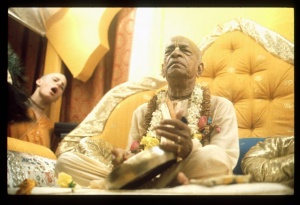CC Adi 17.249 (1975): Difference between revisions
(Vanibot #0027: CCMirror - Mirror CC's 1996 edition to form a basis for 1975) |
(Vanibot #0020: VersionCompareLinker - added a link to the Version Compare feature) |
||
| Line 2: | Line 2: | ||
<div style="float:left">'''[[Sri Caitanya-caritamrta (1975)|Śrī Caitanya-caritāmṛta (1975)]] - [[CC Adi (1975)|Ādi-līlā]] - [[CC Adi 17 (1975)|Chapter 17: The Pastimes of Lord Caitanya Mahāprabhu in His Youth]]'''</div> | <div style="float:left">'''[[Sri Caitanya-caritamrta (1975)|Śrī Caitanya-caritāmṛta (1975)]] - [[CC Adi (1975)|Ādi-līlā]] - [[CC Adi 17 (1975)|Chapter 17: The Pastimes of Lord Caitanya Mahāprabhu in His Youth]]'''</div> | ||
<div style="float:right">[[File:Go-previous.png|link=CC Adi 17.248 (1975)|Ādi-līlā 17.248]] '''[[CC Adi 17.248 (1975)|Ādi-līlā 17.248]] - [[CC Adi 17.250 (1975)|Ādi-līlā 17.250]]''' [[File:Go-next.png|link=CC Adi 17.250 (1975)|Ādi-līlā 17.250]]</div> | <div style="float:right">[[File:Go-previous.png|link=CC Adi 17.248 (1975)|Ādi-līlā 17.248]] '''[[CC Adi 17.248 (1975)|Ādi-līlā 17.248]] - [[CC Adi 17.250 (1975)|Ādi-līlā 17.250]]''' [[File:Go-next.png|link=CC Adi 17.250 (1975)|Ādi-līlā 17.250]]</div> | ||
{{CompareVersions|CC|Adi 17.249|CC 1975|CC 1996}} | |||
{{RandomImage}} | {{RandomImage}} | ||
==== TEXT 249 ==== | ==== TEXT 249 ==== | ||
<div class="verse"> | <div class="verse"> | ||
:kṛṣṇa-nāma nā lao kene, kṛṣṇa- | :kṛṣṇa-nāma nā lao kene, kṛṣṇa-nāma--dhanya | ||
: | :'gopī' 'gopī' balile vā kibā haya puṇya | ||
</div> | </div> | ||
| Line 18: | Line 17: | ||
<div class="synonyms"> | <div class="synonyms"> | ||
kṛṣṇa-nāma—the holy name of Lord Kṛṣṇa; nā—not; lao—You take; kene—why; kṛṣṇa-nāma—the holy name of Lord Kṛṣṇa; dhanya—glorious; gopī gopī—the names | kṛṣṇa-nāma—the holy name of Lord Kṛṣṇa; nā—not; lao—You take; kene—why; kṛṣṇa-nāma—the holy name of Lord Kṛṣṇa; dhanya—glorious; gopī gopī—the names "Gopī, Gopī"; balile—on saying; vā—or; kibā—what; haya—there is; puṇya—piety. | ||
</div> | </div> | ||
| Line 25: | Line 24: | ||
<div class="translation"> | <div class="translation"> | ||
"Why are You chanting the names 'Gopī, Gopī' instead of the holy name of Lord Kṛṣṇa, which is so glorious? What pious result will You achieve by such chanting?" | |||
</div> | </div> | ||
| Line 32: | Line 31: | ||
<div class="purport"> | <div class="purport"> | ||
It is said, vaiṣṇavera kriyā-mudrā vijñeha nā bujhaya: | It is said, vaiṣṇavera kriyā-mudrā vijñeha nā bujhaya: no one can understand the activities of a pure devotee. A student or neophyte devotee could not possibly understand why Śrī Caitanya Mahāprabhu was chanting the name of the gopīs, nor should the student have asked the Lord about the potency of chanting "Gopī, Gopī." The neophyte student was certainlv convinced of the piety in the chanting of Kṛṣṇa's holy name, but this sort of attitude is also offensive. Dharma-vrata-tyāga-hutādi-sarva-śubha-kriyā-sāmyam api pramādaḥ: to chant the holy name of Kṛṣṇa in exchange for the achievement of piety is an offense. This, of course, was unknown to the student. Thus he innocently asked, "What piety is there in the chanting of the name Gopī?" He did not know that there is no question of piety or impiety. The chanting of the holy name of Kṛṣṇa or the holy name Gopī is on the transcendental platform of loving affairs. Since he was not expert in understanding such transcendental activities, his question was merely impudent. Thus Śrī Caitanya Mahāprabhu, apparently greatly angry at him, reacted as follows. | ||
</div> | </div> | ||
Latest revision as of 16:22, 26 January 2020

A.C. Bhaktivedanta Swami Prabhupada
TEXT 249
- kṛṣṇa-nāma nā lao kene, kṛṣṇa-nāma--dhanya
- 'gopī' 'gopī' balile vā kibā haya puṇya
SYNONYMS
kṛṣṇa-nāma—the holy name of Lord Kṛṣṇa; nā—not; lao—You take; kene—why; kṛṣṇa-nāma—the holy name of Lord Kṛṣṇa; dhanya—glorious; gopī gopī—the names "Gopī, Gopī"; balile—on saying; vā—or; kibā—what; haya—there is; puṇya—piety.
TRANSLATION
"Why are You chanting the names 'Gopī, Gopī' instead of the holy name of Lord Kṛṣṇa, which is so glorious? What pious result will You achieve by such chanting?"
PURPORT
It is said, vaiṣṇavera kriyā-mudrā vijñeha nā bujhaya: no one can understand the activities of a pure devotee. A student or neophyte devotee could not possibly understand why Śrī Caitanya Mahāprabhu was chanting the name of the gopīs, nor should the student have asked the Lord about the potency of chanting "Gopī, Gopī." The neophyte student was certainlv convinced of the piety in the chanting of Kṛṣṇa's holy name, but this sort of attitude is also offensive. Dharma-vrata-tyāga-hutādi-sarva-śubha-kriyā-sāmyam api pramādaḥ: to chant the holy name of Kṛṣṇa in exchange for the achievement of piety is an offense. This, of course, was unknown to the student. Thus he innocently asked, "What piety is there in the chanting of the name Gopī?" He did not know that there is no question of piety or impiety. The chanting of the holy name of Kṛṣṇa or the holy name Gopī is on the transcendental platform of loving affairs. Since he was not expert in understanding such transcendental activities, his question was merely impudent. Thus Śrī Caitanya Mahāprabhu, apparently greatly angry at him, reacted as follows.